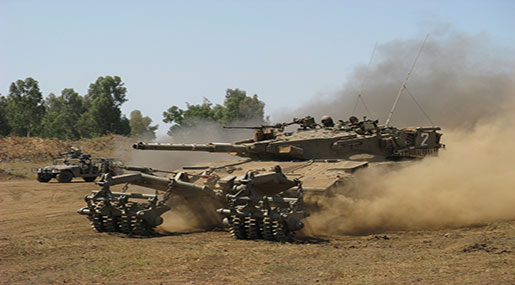The Repercussions of the 2006 War: ‘Israeli’ Soldiers Prefer Prison to the Merkava

Yahya Dabouq
From a secure fortress to a mobile coffin. This is the perception of the Merkava tank in the collective consciousness of the ‘Israelis', after Hezbollah shattered the myth of "the pride of the [‘Israeli'] military industry" in 2006. Since then, the ‘Israeli' army has been seeking to restore confidence in the "most sophisticated and secure tank in the world". But to no avail.

According to ‘Israeli' data before the war, ‘Israels'' armored corps and the Merkava were the most appealing for the soldiers who believed they were safer. A total of six candidates would apply for each vacant place in the armored corps. This reality changed after the war. Now, the military leadership is forcing soldiers to join the armored corps after they moved away from the division.
The ‘Israeli' newspaper "Maariv" revealed that one of the most important challenges facing the military command of the ‘Israeli' army is to restore confidence in the Merkava tank, although more than ten years have passed since the Second Lebanon War in 2006. The paper points out that last year the army faced difficulty in recruiting fighters for the armored Corps. It has also failed in marketing the fourth generation of the Merkava, which is a very sophisticated war machine, serving as ‘Israels'' main deterrent along with its military aircraft, since the entity's establishment in 1948.
The data collected by Maariv last November revealed that 86 soldiers, sampled, refused to join the ranks of the Armored Corps and preferred prison instead, prompting the military command to force them to serve.
The paper also points out that the latest recruitment course revealed alarming data. It showed that infantry brigades as well as the Air Force and the Navy had an excess of recruitment requests. But despite attempting to urge potential recruits, the Armored Corps failed to fulfill the required criteria with respect to the number of application, before the expiration period for recruitment.
According to the data gathered by Maariv, the ‘Israeli' army and the leadership of the Armored Corps are aware of the large gap between the desirable and what is actually being achieved. And for things to get to a point where the recruits actually prefer prison to the Merkava further highlights those gaps and failures in establishing faith in this weapon.
The paper adds that the army is seeking to highlight to the recruits the advantages of serving in the armored corps, but to no avail. The military is attempting to convince potential recruits that they would be part of the main war machine, which would play a decisive role in future battles. Recruits are also being told that they would have the advantage of forging close personal friendships with other crew members, more so than in any other division, emphasizing the availability of an exceptional rehabilitation for each of the volunteers.
This is the "Merkava Syndrome", one of the results of the war in 2006. Maariv concluded in its report that the army should be "advised" to work towards finding "an appropriate formula to reach the heart of the young candidate for service". However, the reality and what is entrenched in the consciousness of the "youth" has no easy solution. It is difficult to convince someone, anyone, to go to battle against Hezbollah in a "mobile coffin".
Source: Al-Akhbar Newspaper
Comments




